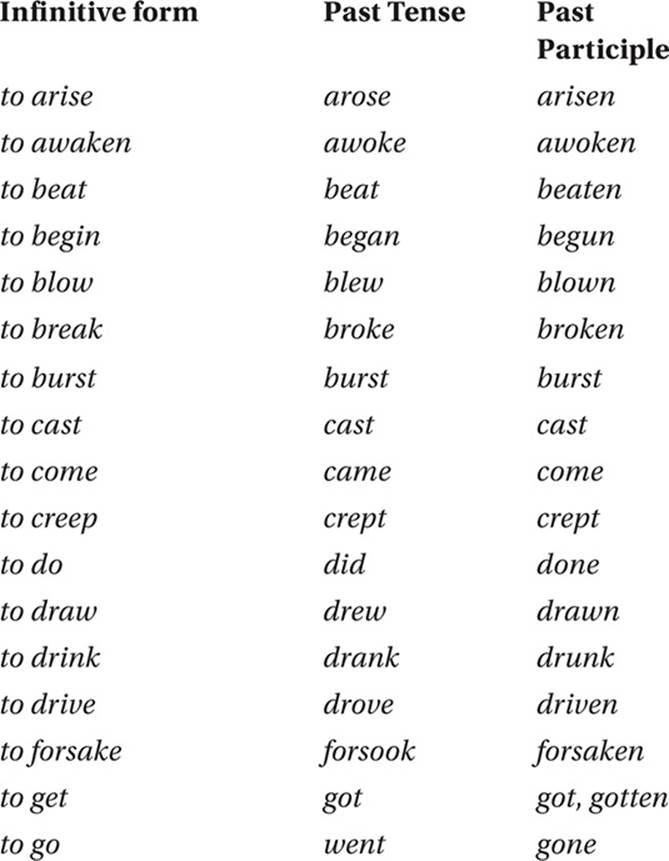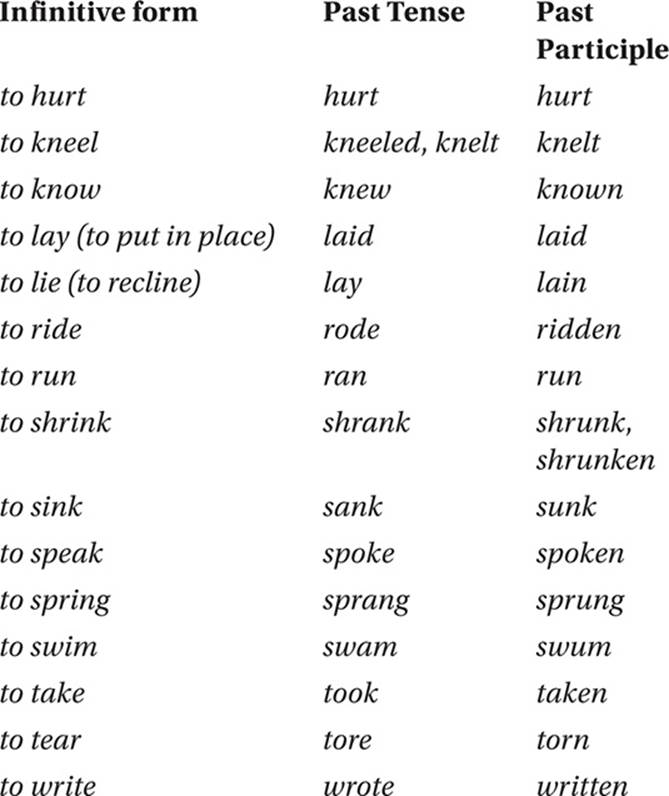SAT 2016
CHAPTER 4
THE SAT WRITING AND LANGUAGE TEST: THE TEN ESSENTIAL RULES
Rule 8: Make Your Verbs Clear and Precise
Lesson 23: Know how to use the consequential or “perfect” aspect
Which is correct?
A. It doesn”t really matter now, because I have been to the mountaintop.
B. It doesn”t really matter now, because I was on the mountaintop.
C. It doesn”t really matter now, because I went to the mountaintop.
Why do sentences B and C sound so uninspiring in comparison to sentence A (adapted from Martin Luther King Jr.”s last speech)? They fall flat because they destroy the meaning conveyed by the tense and aspect of the verb in sentence A. The tense of a verb indicates its place in time: past, present, or future, but the aspect of a verb indicates how its action or status extends to the subject.

Sentence A is obviously about who King is now as a consequence of a previous event, not simply about what he did in the past. In other words, it requires the present tense and the consequential (or “perfect”) aspect. Sentences B and C destroy this essential meaning by putting the verb in the simple past tense.
The aspect of a verb indicates how its action or status extends to the subject, and is generally independent of tense. For instance, a present tense verb can have many different aspects:

Grammatical forms of the consequential (or “perfect”) aspect:

Use the consequential (or “perfect”) aspect (e.g., have taken, had taken, will have taken) when you want to indicate that a status is the consequence of a previous action or status.

Lesson 24: Know how to express historical facts and general ideas
Which is correct?
A. In his book Walden, Thoreau provided a manifesto for self-reliance.
B. In his book Walden, Thoreau provides a manifesto for self-reliance.
Which is correct?
C. The ancient Greek philosopher Zeno taught that motion was an illusion.
D. The ancient Greek philosopher Zeno taught that motion is an illusion.
E. The ancient Greek philosopher Zeno teaches that motion was an illusion.
F. The ancient Greek philosopher Zeno teaches that motion is an illusion.
Because both Zeno and Thoreau are long dead, the first version of each sentence, with past tense verbs, may seem correct. However, it is important to ask: do these sentences indicate historical facts or general ideas?
In Standard English, historical facts take the past tense, but statements about general ideas and references to the content of widely available artistic works usually take the present tense. In an ambiguous case, such as when referring to an idea that has been refuted over the course of history, choose the tense that emphasizes the appropriate quality: use the present tense if you intend to emphasize its “idea-ness,” but use the past tense if you intend to emphasize the fact that it is “history.”
For the first pair of sentences, context is everything. If the sentence were part of a paragraph discussing Thoreau”s life or the history of Transcendentalism, it would be a statement of historical fact, and so choice A would be preferred. If, however, this sentence were part of a discussion of the ideas in Walden, then sentence B would be correct.
The second sentence includes two clauses. The first refers to the historical fact that Zeno was a teacher, and the second refers to a general idea about motion. If you wish to emphasize the “idea-ness” of the second clause, then sentence D is the best choice. If you wish to emphasize the fact that this claim is “history” (that is, no longer believed), then sentence C is the best choice.
Lesson 25: Watch for irregular verbs
Which is correct?
A. Peter was in pain after the run because he had tore his Achilles tendon.
B. Peter was in pain after the run because he had torn his Achilles tendon.
The verb in the second clause takes the consequential (or “perfect”) aspect (Lesson 24), which requires the past participle torn, not tore. The verb to tear is an irregular verb, which means that its past participle is not an -ed form of the verb. The correct sentence is B.

Here is a list of some common irregular verbs. Remember that verbs in the consequential or “perfect” aspect require the past participle form, not the past tense form. For instance, I have drank is the wrong form; I have drunk is correct.

Exercise 11: Verb Tenses and Aspects
Circle the verb form(s) that make each sentence coherent.
1. This morning, Ryan (came/has come/comes) to work with bags under his eyes because he (stayed/had stayed/was staying) up all last night.
2. Already, and without (spending/having spent) so much as an hour on research, Dale (wrote/has written/will write) the first draft of her essay.
3. (Developing/Having developed) the first hydrogen cell automobile, the team (hoped/had hoped) to reveal it to the world at the technology exposition.
4. Right after school, we (went/had gone) to Mario”s for pizza.
5. Surprisingly, Catcher in the Rye (is/was/would be) the only full-length novel that the late J. D. Salinger ever (has published/published/will have published).
6. (Finding/Having found) no evidence against the accused, the detectives (had/had had) to release him.
7. (Being/Having been) captured by the rebels, David soon (began/had begun) to fear he would never escape.
8. When I (arrived/had arrived) home from the museum, I (started/had started/will start) to plan my art project.
9. By the time the committee (adjourned/had adjourned), it (voted/had voted) on all four key proposals.
10. As the seventh inning stretch began, we (did not score/had not scored) a single run.
11. In To Kill a Mockingbird, Harper Lee (uses/used/has used) the character of Dill Harris, whom she (bases/based/has based) on her real-life friend Truman Capote, to embody youthful innocence and imagination.
12. That evening, we (had/had had) a lovely meal with the group with whom we (hiked/had hiked) all afternoon.
13. (Walking/Having walked) all night, this morning we (were/had been) desperate to find a resting spot.
14. By the time I am done with finals, I (will write/will have written) four major papers.
15. (Winning/Having won) her previous three races, Anna (was/had been) confident that she (will win/would win) the next one as well.
16. It surprised us to learn that Venus (is/was/had been) almost the same size as Earth.
17. Buyers often (worry/have worried/will worry) too much about finding a low mortgage rate, and (forget/have forgotten/will forget) to scrutinize the terms of the contract.
18. I am qualified for this job because I (completed/have completed/had completed) two courses in digital marketing.
19. During the time of the ancient Greeks, many physicians (believed/had believed) that illnesses (are caused/were caused) by imbalances in bodily fluids.
20. Students (often worry/will often worry) excessively about grades and not enough about understanding.